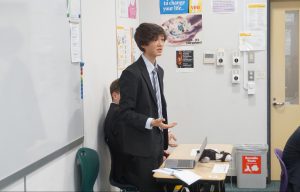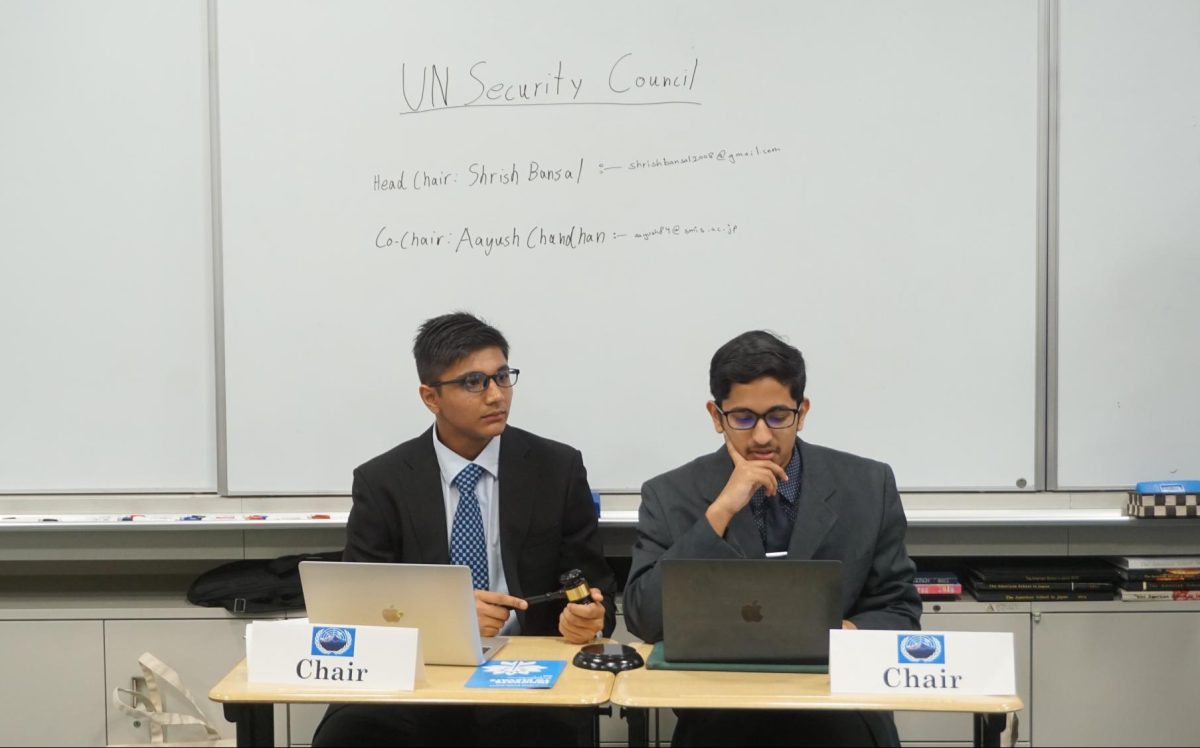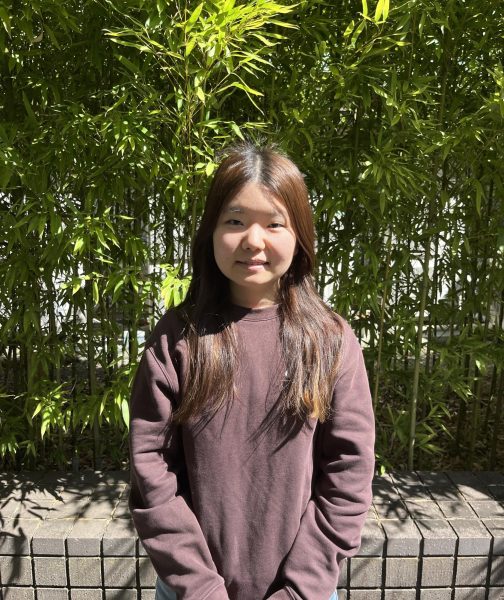Russia, at last, compromised with the U.S. on the clean-up of abandoned chemical weapons. India, the USSR, and Canada signed to establish the Japanese Food Aid Program (JFAP) in post-war Japan. Delegates reached a unanimous agreement on policies combating issues of escalating malnutrition and HIV/AIDS outbreaks in less economically developed countries.
The geopolitical universe in which these actions are situated? ASIJMUN IV.
From April 5th to 6th, ASIJ’s Model United Nations (MUN) club welcomed a record-breaking 11 schools to the ASIJ campus for its fourth annual ASIJMUN conference. Themed “Innovate to Elevate: Breaking Barriers for a Resilient Tomorrow,” the event saw participation from over 120 students representing schools from across the Kanto Plain. With eight committees in session, this event marked the largest ASIJMUN conference in its four-year history.
The conference was run by Secretary-Generals Sophie Lee (‘24) and Ayden Carreon (‘24), and ASIJ students Aarya Bharadwaj (‘24), Zhenyu Zheng (‘25), William Hayes (‘25), Meg Kurosu (‘26), Mirabel Lee (‘26), and Leah Kanegawa (‘25) each served as Head Chairs in one of the eight committees.
MUN mirrors the essence and goals of the actual United Nations (UN). Delegates participating in the conference serve as representatives of assigned nations, advocating for their country’s interests and agendas. Conference committees — including the Economic and Social Council (ECOSOC) and the Security Council (UNSC) — are directly derived from existing organs of the UN.
Like their real-world counterparts, MUN delegates engage in debates and discussions on international policy matters, devising viable solutions to pressing international issues such as the global narcotics trade and gender-based violence. Extensive research and preparation precede these conferences, ensuring informed and constructive discussions.
ASIJMUN IV emphasized the significance of challenging the status quo and innovating responsibly. “We remind delegates that innovation may begin on smaller scales, such as this conference, but serves as a foundation for meaningful, impactful elevation on a global scale,” Ayden said in his opening remarks. “We encourage delegates to seek out the significance of their actions, the implications of their writing, and the beneficiaries of their policies.”
In line with the conference’s theme, ASIJ invited guest speaker Trista Bridges, co-founder of sustainability consulting firm Read the Air, to set the tone for the following two days.
Bringing over ten years of experience in strategy and sustainable business, Bridges discussed the role of artificial intelligence in streamlining a transition to a green economy and the importance of lifelong learning and growth. “Being a changemaker will not be something that you will do for a few years,” Bridges said. “It will be a lifelong journey, and it will be underpinned by a lot of changes in society that will go on through this journey for you — and you want to make sure you never stop learning.”

ASIJMUN IV was a valuable and intellectually stimulating experience for many. “The thrill you get from delivering a speech to a whole committee and facing a bombardment of hostile questions from your rivals is unmatched,” ASIJ student Kai Doust (‘25), an American delegate in the Security Council with Russia, China, and Syria, said.
“Having to think of impromptu arguments to defend your stance under heavy pressure is challenging but also endlessly rewarding, and finding a way to resolve those conflicts is what MUN is all about,” Kai added.
Emma Narvaez (‘24) from Saint Maur International School was initially contemplating whether or not to join the conference as she “didn’t have much interest in international relations” and had other senior commitments. “However, I’m beyond grateful to have joined, as all of the chairs and delegates at the conference were very encouraging, and the event as a whole actually triggered my newfound interest in global affairs,” Emma said.
Although the conference boasted a rigorous and intense environment, ASIJMUN IV also welcomed delegates who had little to no prior experience. Urika Suzuki (‘26), a sophomore from Aoba Japan International School, recalled giving her first MUN speech as a delegate of Ethiopia to the Human Rights Committee. “I struggled with making a speech in front of everyone, but one of the chairs, Aarya, pushed me to just go for it,” Urika said. “Even though it seemed like a small moment, it was pretty significant to me and it helped me overcome my fears and feel a bit more confident in myself.”
On the second and final day of the conference, many key resolutions and directives were passed following hours of negotiation. In the UNSC specifically, Kai noted that Sweden’s proposal on new regulations for chemical weapons oversight by the UN was “almost certainly” going to be vetoed by Russia. “After some negotiating, amazingly, Russia let it pass,” Kai said. “This remarkable show of good sportsmanship on Russia’s part reminded me about the true purpose of MUN: to work with and include everyone, in order to create a better world.”
In the span of three years, ASIJMUN has evolved from being hosted on a Discord server, to adopting a hybrid format using Google Meets, to eventually expanding internationally, welcoming students from South Korea. “We know that the continued growth of this conference will affect real internationalism and foster practical diplomacy,” Ayden said.
In addition to expanding the conference to more students, a primary objective of ASIJMUN IV was to foster effective communication, understanding, and empathy among delegates, particularly in the context of navigating a polarized political landscape. “From the outbreak of a global pandemic, COVID-19, to the continued violence and dispute in the Gaza Strip, it seems like our world is facing endless problems from all corners of the world,” Secretary-General Sophie Lee remarked.
“We are growing up in a time that has been characterized by rapid change and development, but fortunately, we get to be the driving force behind these changes,” she said.
For a more in-depth look at the conference’s key clashes and resolutions, check out Hanabi’s exclusive report here.


